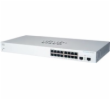KATEGORIE
Zpět k nákupu
Cisco switch CBS220-16T-2G (16xGbE,2xSFP,fanless) - REFRESH
3153 Kč
2606 Kč bez DPH
Dostupnost: Skladem v eshopu 🛈
Part no.: CBS220-16T-2G-EU-RF
Kód produktu: 23988022
Výrobce: CISCO
Záruka: 36 měsíců
Popis produktu
CISCO REFRESH jsou repasované produkty, které společnost CISCO dodává s certifikací kvality, zárukou a servisní podporou odpovídající ekvivalentnímu novému produktu
Řada Cisco Business 220 jsou jednoduché a cenově dostupné chytré switche pro sítě podnikové třídy. Díky podpoře mobilních aplikací, nástroji Cisco Business Dashboard a několika
možnostem PoE+ poskytuje CBS220 robustní síť v rámci omezeného rozpočtu.
Stránky produktu: CBS220-16T-2G
Quick start guide: Quick start guide
Switching capacity Forwarding rate in millions of packets per second (mpps; 64-byte packets) 26,78
Switching capacity in Gigabits per second (Gbps) 36
Layer 2 switching MAC table Up to 8,192 Media Access Control (MAC) addresses
Spanning Tree Protocol (STP) Standard 802.1d Spanning Tree support, enabled by default
Fast convergence using 802.1w (Rapid Spanning Tree [RSTP])
Multiple Spanning Tree instances using 802.1s (MSTP)
16 instances are supported
Port grouping Support for IEEE 802.3ad Link Aggregation Control Protocol (LACP)
Up to 8 groups
Up to 8 ports per group with 16 candidate ports for each (dynamic) 802.3ad link aggregation
Load balance based on source and destination MAC address, or source and destination MAC/IP
VLAN Support for up to 256 Virtual Local Area Networks (VLANs) simultaneously
Port-based and 802.1Q tag-based VLANs
Management VLAN
Guest VLAN
Auto voice VLAN Voice traffic is automatically assigned to a voice-specific VLAN and treated with appropriate levels of QoS
QinQ VLAN VLANs transparently cross a service provider network while isolating traffic among customers
Generic VLAN Registration Protocol (GVRP) and Generic Attribute Registration Protocol (GARP) Protocols for automatically propagating and configuring VLANs in a bridged domain
Head-of-Line (HOL) blocking HOL blocking prevention
Jumbo frame Frame sizes up to 9,216 supported
Loopback detection Loopback detection provides protection against loops by transmitting loop protocol packets out of ports on which loop protection has been enabled. It operates independently of STP.
Automatic Media-Dependent Interface Crossover (MDIX) Automatically adjusts transmit and receive pairs if an incorrect cable type (crossover or straight-through) is installed.
Security ACLs Drop or rate limit based on source and destination MAC, VLAN ID or IP address, protocol, port, Differentiated Services Code Point (DSCP)/IP precedence, Transmission Control Protocol (TCP)/ User Datagram Protocol (UDP) source and destination ports, 802.1p priority, Ethernet type, Internet Control Message Protocol (ICMP) packets, Internet Group Management Protocol (IGMP) packets, TCP flag
Support up to 512 rules
Port security Creates the ability to lock source MAC addresses to ports; limits the number of learned MAC addresses
IEEE 802.1X (authenticator role) 802.1X: Remote Authentication Dial-in User Service (RADIUS) authentication; guest VLAN;
Single-host, multiple-host, and multisession mode
RADIUS, TACACS+ Supports RADIUS and Terminal Access Controller Access Control System (TACACS) authentication; switch functions as a client
MAC address filtering Supported
Storm control Broadcast, multicast, and unknown unicast
DoS protection DOS attack prevention
STP Bridge Protocol Data Unit (BPDU) Guard This security mechanism protects the network from invalid configurations. A port enabled for BPDU Guard is shut down if a BPDU message is received on that port.
Spanning Tree Loop Guard This feature provides additional protection against Layer 2 forwarding loops (STP loops).
Secure Shell (SSH) Protocol SSH is a secure replacement for Telnet traffic. SCP also uses SSH. SSH v1 and v2 are supported.
Secure Sockets Layer (SSL) SSL support: Encrypts all HTTPS traffic, allowing highly secure access to the browser-based management GUI in the switch
QoS Priority levels 8 hardware queues per port
Scheduling Strict priority and Weighted Round-Robin (WRR) queue assignment based on DSCP and class of service (802.1p/CoS)
Class of service Port-based; 802.1p VLAN priority-based; IPv4/v6 IP precedence, Type of Service (ToS), and DSCP-based; Differentiated Services (DiffServ); classification and re-marking ACLs, trusted QoS
Rate limiting Ingress policer; egress shaping and rate control; per VLAN, per port, and flow-based
Congestion avoidance A TCP congestion avoidance algorithm is required to reduce and prevent global TCP loss synchronization.
Multicast Internet Group Management Protocol (IGMP) Versions 1, 2, and 3 Snooping IGMP limits bandwidth-intensive multicast traffic to only the requesters; supports 256 multicast groups
IGMP querier IGMP querier is used to support a Layer 2 multicast domain of snooping switches in the absence of a multicast router
Standards Standards IEEE 802.3 10BASE-T Ethernet, IEEE 802.3u 100BASE-TX Fast Ethernet, IEEE 802.3ab
1000BASE-T Gigabit Ethernet, IEEE 802.3ad LACP, IEEE 802.3z Gigabit Ethernet, IEEE
802.3x Flow Control, IEEE 802.1D (STP, GARP, and GVRP), IEEE 802.1Q/p VLAN, IEEE
802.1w RSTP, IEEE 802.1s Multiple STP, IEEE 802.1X Port Access Authentication, IEEE
802.3af, IEEE 802.3at, RFC 768, Request for Comments (RFC) 783, RFC 791, RFC 792, RFC 793, RFC 813, RFC 879, RFC 896, RFC 826, RFC 854, RFC 855, RFC 856, RFC 858, RFC 894, RFC 919, RFC 922, RFC 920, RFC 950, RFC 1042, RFC 1071, RFC 1123, RFC 1141, RFC 1155, RFC 1157, RFC
1350, RFC 1533, RFC 1541, RFC 1624, RFC 1700, RFC 1867, RFC 2030, RFC 2616, RFC
2131, RFC 2132, RFC 3164, RFC 3411, RFC 3412, RFC 3413, RFC 3414, RFC 3415, RFC
2576, RFC 4330, RFC 1213, RFC 1215, RFC 1286, RFC 1442, RFC 1451, RFC 1493, RFC
1573, RFC 1643, RFC 1757, RFC 1907, RFC 2011, RFC 2012, RFC 2013, RFC 2233, RFC
2618, RFC 2665, RFC 2666, RFC 2674, RFC 2737, RFC 2819, RFC 2863, RFC 1157, RFC
1493, RFC 1215, RFC 3416
IPv6 IPv6 IPv6 host mode
IPv6 over Ethernet
IPv6/IPv4 Dual Stack
IPv6 neighbor and router discovery (ND)
IPv6 stateless address auto-configuration
Path Maximum Transmission Unit (MTU) discovery
Duplicate Address Detection (DAD)
ICMP version 6
IPv6 ACL Drop or rate limit IPv6 packets in hardware
IPv6 QoS Prioritize IPv6 packets in hardware
Multicast Listener Discovery (MLD v1/2) Snooping Deliver IPv6 multicast packets only to the required receivers
IPv6 applications Web/SSL, Telnet server/SSH, DHCP Client, DHCP Autoconfig, Cisco Discovery Protocol (CDP), Link Layer Discovery Protocol (LLDP)
IPv6 Requests for Comments (RFCs) supported RFC 4443 (which obsoletes RFC2463) - ICMP version 6
RFC 4291 (which obsoletes RFC 3513) - IPv6 address architecture
RFC 4291 - IPv6 addressing architecture
RFC 2460 - IPv6 specification
RFC 4861 (which obsoletes RFC 2461) - Neighbor discovery for IPv6
RFC 4862 (which obsoletes RFC 2462) - IPv6 stateless address auto-configuration
RFC 1981 - Path MTU discovery
RFC 4007 - IPv6 scoped address architecture
RFC 3484 - Default address selection mechanism
Management Cisco Business Dashboard Support direct management with Cisco Business Dashboard and mobile app. Eliminates the need to set up a separate hardware or virtual machine for the Cisco Business Dashboard Probe on site.
Cisco Business mobile app Mobile app for Cisco Business Switch and Wireless products. Helps to set up a local network in minutes and provide easy management at your fingertips.
Cisco Network Plug and Play (PnP) agent The Cisco Network Plug and Play solution provides a simple, secure, unified, and integrated offering to ease new branch or campus device rollouts or for provisioning updates to an existing network. The solution provides a unified approach to provision Cisco routers, switches
Popis produktu
Cisco switch CBS220-16T-2G - REFRESHCISCO REFRESH jsou repasované produkty, které společnost CISCO dodává s certifikací kvality, zárukou a servisní podporou odpovídající ekvivalentnímu novému produktu
Řada Cisco Business 220 jsou jednoduché a cenově dostupné chytré switche pro sítě podnikové třídy. Díky podpoře mobilních aplikací, nástroji Cisco Business Dashboard a několika
možnostem PoE+ poskytuje CBS220 robustní síť v rámci omezeného rozpočtu.
Stránky produktu: CBS220-16T-2G
Quick start guide: Quick start guide
Switching capacity Forwarding rate in millions of packets per second (mpps; 64-byte packets) 26,78
Switching capacity in Gigabits per second (Gbps) 36
Layer 2 switching MAC table Up to 8,192 Media Access Control (MAC) addresses
Spanning Tree Protocol (STP) Standard 802.1d Spanning Tree support, enabled by default
Fast convergence using 802.1w (Rapid Spanning Tree [RSTP])
Multiple Spanning Tree instances using 802.1s (MSTP)
16 instances are supported
Port grouping Support for IEEE 802.3ad Link Aggregation Control Protocol (LACP)
Up to 8 groups
Up to 8 ports per group with 16 candidate ports for each (dynamic) 802.3ad link aggregation
Load balance based on source and destination MAC address, or source and destination MAC/IP
VLAN Support for up to 256 Virtual Local Area Networks (VLANs) simultaneously
Port-based and 802.1Q tag-based VLANs
Management VLAN
Guest VLAN
Auto voice VLAN Voice traffic is automatically assigned to a voice-specific VLAN and treated with appropriate levels of QoS
QinQ VLAN VLANs transparently cross a service provider network while isolating traffic among customers
Generic VLAN Registration Protocol (GVRP) and Generic Attribute Registration Protocol (GARP) Protocols for automatically propagating and configuring VLANs in a bridged domain
Head-of-Line (HOL) blocking HOL blocking prevention
Jumbo frame Frame sizes up to 9,216 supported
Loopback detection Loopback detection provides protection against loops by transmitting loop protocol packets out of ports on which loop protection has been enabled. It operates independently of STP.
Automatic Media-Dependent Interface Crossover (MDIX) Automatically adjusts transmit and receive pairs if an incorrect cable type (crossover or straight-through) is installed.
Security ACLs Drop or rate limit based on source and destination MAC, VLAN ID or IP address, protocol, port, Differentiated Services Code Point (DSCP)/IP precedence, Transmission Control Protocol (TCP)/ User Datagram Protocol (UDP) source and destination ports, 802.1p priority, Ethernet type, Internet Control Message Protocol (ICMP) packets, Internet Group Management Protocol (IGMP) packets, TCP flag
Support up to 512 rules
Port security Creates the ability to lock source MAC addresses to ports; limits the number of learned MAC addresses
IEEE 802.1X (authenticator role) 802.1X: Remote Authentication Dial-in User Service (RADIUS) authentication; guest VLAN;
Single-host, multiple-host, and multisession mode
RADIUS, TACACS+ Supports RADIUS and Terminal Access Controller Access Control System (TACACS) authentication; switch functions as a client
MAC address filtering Supported
Storm control Broadcast, multicast, and unknown unicast
DoS protection DOS attack prevention
STP Bridge Protocol Data Unit (BPDU) Guard This security mechanism protects the network from invalid configurations. A port enabled for BPDU Guard is shut down if a BPDU message is received on that port.
Spanning Tree Loop Guard This feature provides additional protection against Layer 2 forwarding loops (STP loops).
Secure Shell (SSH) Protocol SSH is a secure replacement for Telnet traffic. SCP also uses SSH. SSH v1 and v2 are supported.
Secure Sockets Layer (SSL) SSL support: Encrypts all HTTPS traffic, allowing highly secure access to the browser-based management GUI in the switch
QoS Priority levels 8 hardware queues per port
Scheduling Strict priority and Weighted Round-Robin (WRR) queue assignment based on DSCP and class of service (802.1p/CoS)
Class of service Port-based; 802.1p VLAN priority-based; IPv4/v6 IP precedence, Type of Service (ToS), and DSCP-based; Differentiated Services (DiffServ); classification and re-marking ACLs, trusted QoS
Rate limiting Ingress policer; egress shaping and rate control; per VLAN, per port, and flow-based
Congestion avoidance A TCP congestion avoidance algorithm is required to reduce and prevent global TCP loss synchronization.
Multicast Internet Group Management Protocol (IGMP) Versions 1, 2, and 3 Snooping IGMP limits bandwidth-intensive multicast traffic to only the requesters; supports 256 multicast groups
IGMP querier IGMP querier is used to support a Layer 2 multicast domain of snooping switches in the absence of a multicast router
Standards Standards IEEE 802.3 10BASE-T Ethernet, IEEE 802.3u 100BASE-TX Fast Ethernet, IEEE 802.3ab
1000BASE-T Gigabit Ethernet, IEEE 802.3ad LACP, IEEE 802.3z Gigabit Ethernet, IEEE
802.3x Flow Control, IEEE 802.1D (STP, GARP, and GVRP), IEEE 802.1Q/p VLAN, IEEE
802.1w RSTP, IEEE 802.1s Multiple STP, IEEE 802.1X Port Access Authentication, IEEE
802.3af, IEEE 802.3at, RFC 768, Request for Comments (RFC) 783, RFC 791, RFC 792, RFC 793, RFC 813, RFC 879, RFC 896, RFC 826, RFC 854, RFC 855, RFC 856, RFC 858, RFC 894, RFC 919, RFC 922, RFC 920, RFC 950, RFC 1042, RFC 1071, RFC 1123, RFC 1141, RFC 1155, RFC 1157, RFC
1350, RFC 1533, RFC 1541, RFC 1624, RFC 1700, RFC 1867, RFC 2030, RFC 2616, RFC
2131, RFC 2132, RFC 3164, RFC 3411, RFC 3412, RFC 3413, RFC 3414, RFC 3415, RFC
2576, RFC 4330, RFC 1213, RFC 1215, RFC 1286, RFC 1442, RFC 1451, RFC 1493, RFC
1573, RFC 1643, RFC 1757, RFC 1907, RFC 2011, RFC 2012, RFC 2013, RFC 2233, RFC
2618, RFC 2665, RFC 2666, RFC 2674, RFC 2737, RFC 2819, RFC 2863, RFC 1157, RFC
1493, RFC 1215, RFC 3416
IPv6 IPv6 IPv6 host mode
IPv6 over Ethernet
IPv6/IPv4 Dual Stack
IPv6 neighbor and router discovery (ND)
IPv6 stateless address auto-configuration
Path Maximum Transmission Unit (MTU) discovery
Duplicate Address Detection (DAD)
ICMP version 6
IPv6 ACL Drop or rate limit IPv6 packets in hardware
IPv6 QoS Prioritize IPv6 packets in hardware
Multicast Listener Discovery (MLD v1/2) Snooping Deliver IPv6 multicast packets only to the required receivers
IPv6 applications Web/SSL, Telnet server/SSH, DHCP Client, DHCP Autoconfig, Cisco Discovery Protocol (CDP), Link Layer Discovery Protocol (LLDP)
IPv6 Requests for Comments (RFCs) supported RFC 4443 (which obsoletes RFC2463) - ICMP version 6
RFC 4291 (which obsoletes RFC 3513) - IPv6 address architecture
RFC 4291 - IPv6 addressing architecture
RFC 2460 - IPv6 specification
RFC 4861 (which obsoletes RFC 2461) - Neighbor discovery for IPv6
RFC 4862 (which obsoletes RFC 2462) - IPv6 stateless address auto-configuration
RFC 1981 - Path MTU discovery
RFC 4007 - IPv6 scoped address architecture
RFC 3484 - Default address selection mechanism
Management Cisco Business Dashboard Support direct management with Cisco Business Dashboard and mobile app. Eliminates the need to set up a separate hardware or virtual machine for the Cisco Business Dashboard Probe on site.
Cisco Business mobile app Mobile app for Cisco Business Switch and Wireless products. Helps to set up a local network in minutes and provide easy management at your fingertips.
Cisco Network Plug and Play (PnP) agent The Cisco Network Plug and Play solution provides a simple, secure, unified, and integrated offering to ease new branch or campus device rollouts or for provisioning updates to an existing network. The solution provides a unified approach to provision Cisco routers, switches
Přes veškerou snahu zajistit co nejpřesnější popis, obrázky a technické parametry produktů nemůžeme zaručit, že uváděná data odpovídají skutečnosti. Řada výrobců si vyhrazuje právo změny některých parametrů či vlastností bez předchozího upozornění. Potřebujete-li ujištění o určitých parametrech produktu nebo v případě pochybností, kontaktujte prosím svého obchodníka. Pozdější reklamace vlastností je zbytečnou komplikací pro obě strany.


















